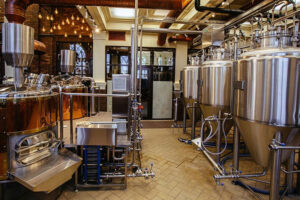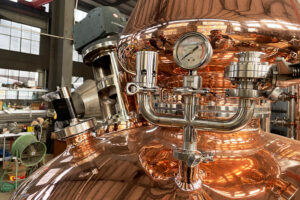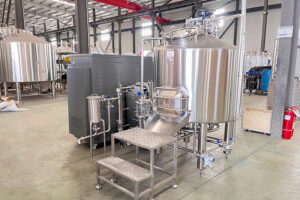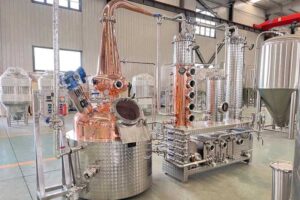
How do beginners choose brewhouse equipment correctly?
Beer brewing combines science and art, and professional equipment is the key to achieving this. For home brewers, the right equipment can help accurately control every link and improve the quality of the beer; while for larger breweries, advanced equipment can increase production and maintain product consistency. A deep understanding of different types of brewhouse

Stainless Steel Wine Fermenters: The Complete Guide to Choosing the Best Wine Fermenter for Quality Wine
Craft quality wine with the best stainless steel wine fermenter. Learn how to choose the right wine fermenter for your needs and start your ferment today!

Winery Equipment Guide: Mastering Wine Brewing Equipment and Wine Fermenters for Exceptional Winemaking
Explore our winery equipment guide! Master winemaking with essential wine brewing equipment and wine fermenters. From grape to bottle, elevate your wine.

Distillery Equipment That Grows With You: A Clear‑Cut Guide for Craft Distilleries, Brewpubs Dreams
Your guide to distillery equipment: Affordable distilling equipment & stills that scale. Find mash tuns, fermenters, and distillation equipment for vodka, gin, rum, brandy & moonshine.

Микропивоварня объемом 450 л, занимает мало места и проста в эксплуатации
Оборудование для микропивоварения – это комплексная система, предназначенная для мелкосерийного производства крафтового пива. Это микропивоваренное оборудование объемом 450 л значительно повышает стабильность пивоварения благодаря методу парового нагрева, который обеспечивает точный контроль температуры и равномерный нагрев. Оборудование оснащено стеклянным балансировочным баком, который позволяет наблюдать за прозрачностью сусла в режиме реального времени и эффективно защищать зерновой слой,

Denmark 450L turnkey solution distillation equipment
This is a set of 450L turnkey solution distillation equipment we provided to Danish customers. The equipment includes: a crusher, 450L mash/lautertun, 2*450L fermentation tanks, 450L multi-functional distiller, 50L CIP system, 1000L glycol water tank, and a PID control system, which builds an efficient and small process distillation production line. The 450L distillation equipment adopts

How to use distillation equipment to produce whiskey?
Whiskey, a spirit loved by consumers around the world, has a complex flavor and rich layers. Among many spirits, the production process of whiskey is particularly particular. From material selection, fermentation, distillation to maturation, each step affects the final quality. Among them, the distillation process is the key link that determines the style and purity

How can a beginner prepare to start a kombucha brewery?
As a healthy drink, Kombucha has seen a sharp rise in popularity worldwide in recent years. Its unique fermentation process and rich probiotic content make it a healthy choice for people’s daily diet. Kombucha not only tastes refreshing but is also rich in antioxidants that help digestion and immune system maintenance. The unique charm of

Brewery Equipment: How Much Does It Cost to Start Brewing?
Brewery Equipment: How Much Does It Cost to Start Brewing? Explore brewery equipment costs, including microbrewery equipment. Plan to start a brewery & estimate equipment costs.

Brewery Manufacturer: Commercial Craft Beer and Brewing Equipment for Your Brewing Company
Brewery Manufacturer: Commercial Craft Beer and Brewing Equipment for Your Brewing Company. Quality brewing equipment & systems for your craft beer brewery. Design & supply solutions for beer making.
Learn more about winemaking
If you want to learn more about winemaking, you can subscribe to our blog for updates. We will update the blog every week so that you can learn more about winemaking.
